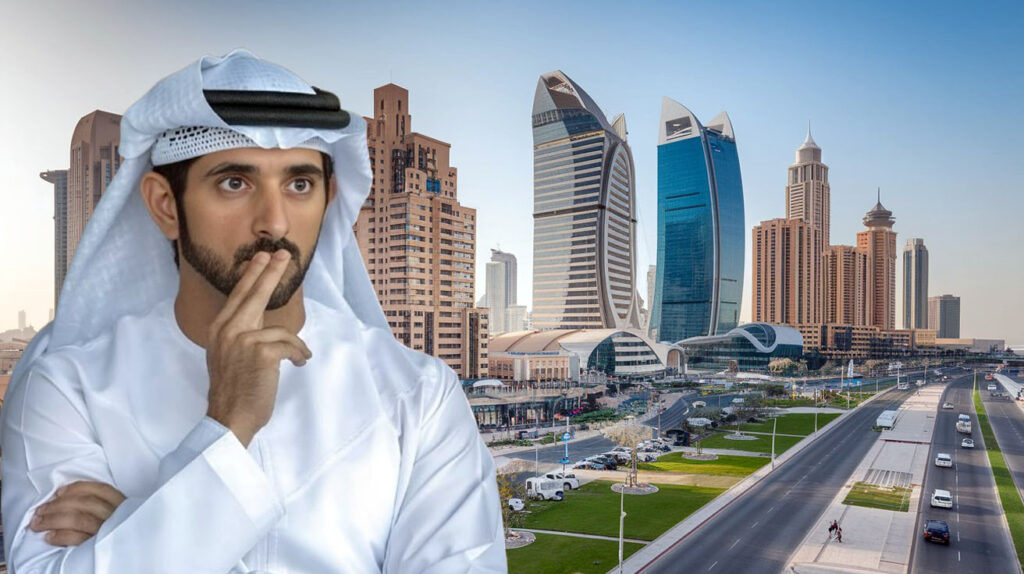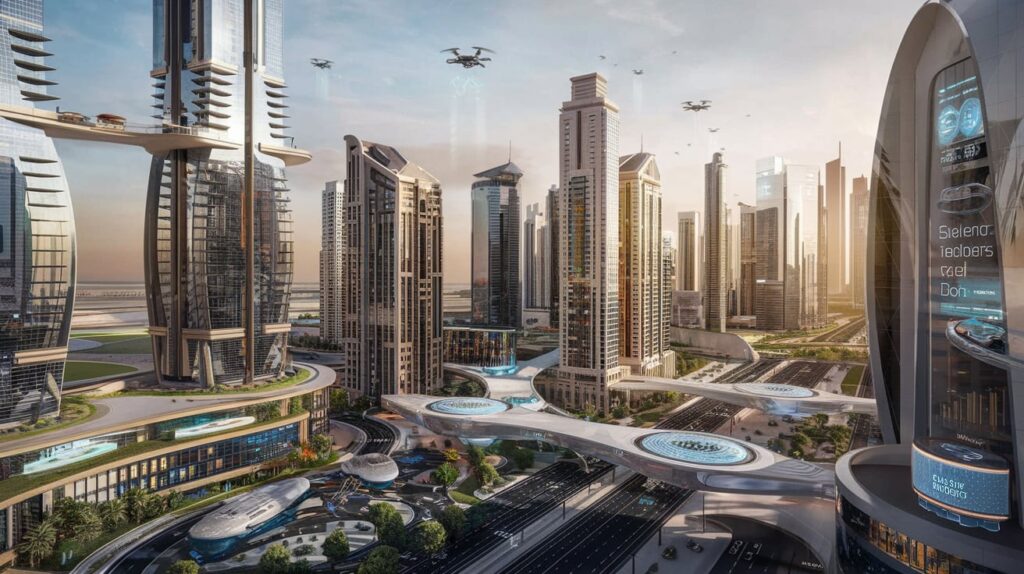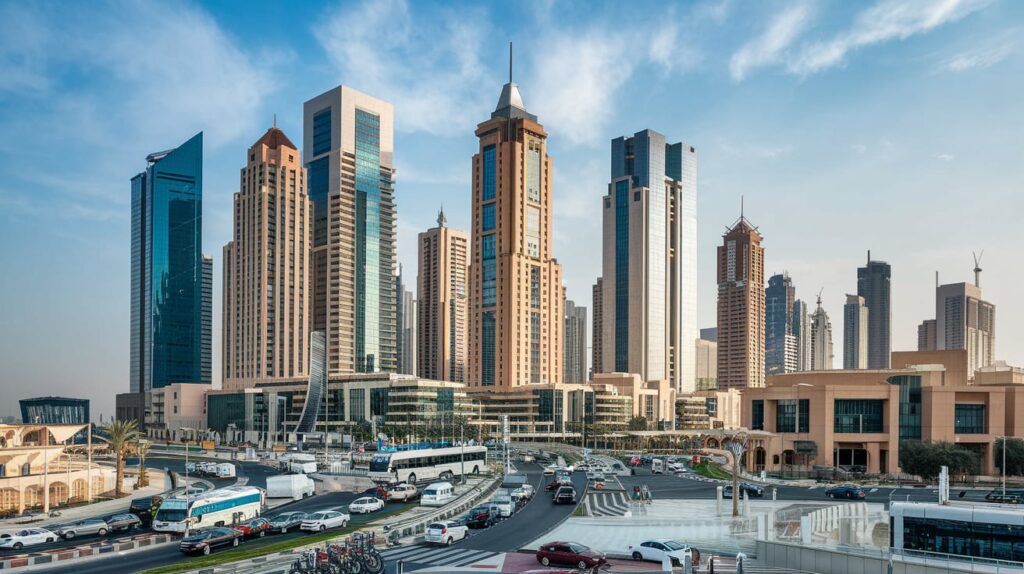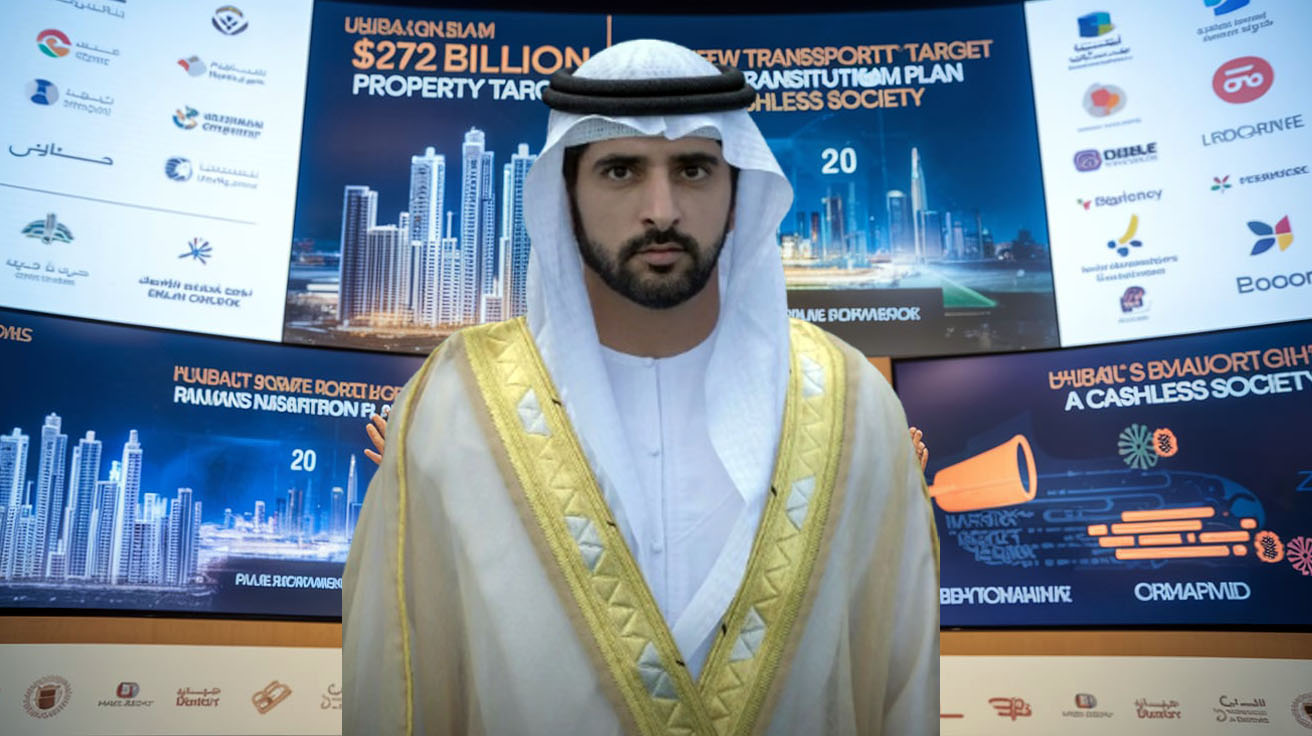Dubai Announces Major Real Estate and Education Strategies: $272 Billion Property Target, New Transport System, and Cashless Society Goal
Dubai is a city known for its rapid development and vision for the future. Recently, the government has announced new major strategies in real estate, education, transport, and its goal of becoming a cashless society. These new plans are part of Dubai’s aim to grow its economy, improve the quality of life for its residents, and maintain its status as one of the world’s most forward-thinking cities.

Real Estate Strategy: A $272 Billion Target
Dubai’s real estate sector has been one of the driving forces of its economy for many years. The city has become famous for its impressive skyline, luxury properties, and ambitious construction projects. As part of its new plan, Dubai has set a huge target: $272 billion worth of real estate transactions over the next few years.
The government has introduced several new strategies to achieve this goal. One of the most important parts of this strategy is the launch of the Dubai Economic Agenda (D33), which aims to double the size of the economy by 2033. Real estate plays a central role in this plan. To attract more investors, the government plans to simplify property regulations, making it easier for foreign investors to buy property in Dubai.
To reach the $272 billion target, Dubai also plans to build more residential, commercial, and hospitality projects. With a growing population and increasing demand for both residential and commercial properties, the city aims to keep up with the demand and maintain its global reputation as a real estate hotspot.

Focus on Luxury Properties and High-Quality Developments
One key part of the real estate strategy is the focus on high-end developments. Dubai has always been known for its luxury properties, and this trend is set to continue. Developers are focusing on creating exclusive and high-quality projects that will appeal to wealthy buyers from around the world. These developments include high-rise towers, exclusive waterfront properties, and private gated communities.
With Dubai attracting high-net-worth individuals from around the world, luxury properties are expected to remain a strong part of the market. New projects like Palm Jebel Ali and Dubai Creek Harbour are examples of the type of iconic developments that are set to shape Dubai’s future real estate landscape.
Sustainable and Smart Developments
In addition to luxury, Dubai is also focusing on sustainability and smart technology in its real estate sector. The city is working to build “smart” communities that incorporate the latest technology for energy efficiency, security, and convenience. Many new developments will feature green spaces, renewable energy sources, and advanced waste management systems.
The government has made it clear that future real estate projects must align with Dubai’s sustainability goals. This is not only good for the environment but also helps to attract a new generation of buyers and investors who prioritize eco-friendly and technology-driven homes.
Education Strategy: Improving Dubai’s Schools and Universities
Along with real estate, education is another key sector in Dubai’s long-term strategy. The government has announced plans to improve its education system to ensure that it meets the needs of the city’s growing population. The goal is to make Dubai a global education hub, attracting students from around the world while providing world-class education for its residents.

Increasing Access to Quality Education
The government has committed to increasing the number of schools and universities in Dubai, with a focus on providing more options for parents and students. The goal is to create a diverse range of educational institutions, from public schools to private international schools, and from vocational training centers to world-class universities.
This expansion is part of Dubai’s efforts to accommodate its growing population. The city’s population has been increasing rapidly, and more families are moving to Dubai for work and better living conditions. As a result, the demand for high-quality education is on the rise, and the government aims to meet this demand by building new schools and improving existing ones.
Digital Transformation in Education
Another important part of Dubai’s education strategy is the focus on digital learning. The government plans to invest heavily in technology to improve learning experiences. This includes integrating digital tools in classrooms, providing students with access to online resources, and using artificial intelligence (AI) to personalize learning.
Dubai aims to lead in “smart education,” where students can access learning materials from anywhere at any time. By incorporating technology into the education system, Dubai wants to ensure that its students are well-prepared for the future job market, especially in tech-driven industries.
Partnerships with Top International Universities
To further boost its education sector, Dubai is seeking to partner with top international universities. This will not only improve the quality of higher education available in Dubai but also help attract international students to study in the city. These partnerships are expected to provide students with more opportunities for research, internships, and job placements, both in Dubai and globally.
By becoming a global education hub, Dubai hopes to nurture local talent while attracting top international students, contributing to its knowledge-based economy.
New Transport System: Enhancing Mobility in Dubai
As part of its development plans, Dubai is investing in a new and improved transport system. The goal is to create a world-class public transport network that is efficient, sustainable, and accessible to all residents and visitors.
Expanding the Metro and Public Transport Network
One of the key components of this new transport strategy is the expansion of the Dubai Metro. The metro system has been a huge success since its launch, helping to reduce traffic congestion and providing a fast and reliable way for people to travel across the city. The government plans to extend the metro lines to cover more areas of Dubai, making it even easier for people to use public transport.
In addition to the metro, Dubai is also investing in other forms of public transport, including buses, trams, and water taxis. The goal is to create an integrated transport system where all forms of transport are connected, allowing people to move around the city quickly and easily.
Smart Mobility Solutions
Dubai is also focusing on smart mobility solutions as part of its transport strategy. This includes the use of self-driving cars, electric vehicles, and ride-sharing platforms. The government is working with tech companies to develop innovative transport solutions that will make getting around Dubai more convenient and environmentally friendly.
One exciting project is the introduction of autonomous taxis, which are expected to be rolled out in the coming years. These driverless cars will be equipped with the latest technology to ensure safety and efficiency, making Dubai one of the first cities in the world to adopt self-driving technology on a large scale.
Supporting Cycling and Walking
Dubai is also promoting cycling and walking as part of its efforts to create a more sustainable city. New cycling paths are being built, and more areas are being made pedestrian-friendly. The government wants to encourage people to use these eco-friendly modes of transport as part of a healthier lifestyle and to reduce the city’s carbon footprint.
Cashless Society Goal: A Future Without Physical Money
Dubai is also aiming to become a fully cashless society in the near future. The government has launched several initiatives to promote digital payments and reduce the use of physical cash in everyday transactions.
Digital Payment Platforms
Dubai is encouraging businesses and individuals to use digital payment platforms for all transactions, from shopping to paying bills. This includes the use of credit cards, mobile payment apps, and online banking services. The government is working to ensure that digital payments are secure and easy to use, which will help to build trust among residents and visitors.
By going cashless, Dubai hopes to make transactions faster, more convenient, and more transparent. A cashless society also helps to reduce the risk of fraud and money laundering, making the financial system safer for everyone.
Financial Inclusion
One of the goals of the cashless society initiative is to promote financial inclusion. The government wants to ensure that everyone in Dubai has access to digital banking and payment services, regardless of their income level. This includes providing support for small businesses and low-income individuals to help them transition to digital payments.
Future of Fintech in Dubai
The move towards a cashless society is part of Dubai’s broader strategy to become a global leader in fintech (financial technology). The city is already home to a growing number of fintech companies, and the government is actively encouraging innovation in this sector. By embracing fintech, Dubai aims to attract more investors and create new job opportunities in the technology and finance sectors.
Conclusion: A Vision for the Future
Dubai’s new strategies in real estate, education, transport, and finance show that the city is serious about its vision for the future. By setting ambitious goals and investing in key sectors, Dubai aims to continue its rapid development and maintain its position as a global leader.
The $272 billion real estate target, improvements in education, the development of a world-class transport system, and the move towards a cashless society all point towards a future where Dubai is even more advanced, sustainable, and attractive to both residents and visitors alike.
As these plans are implemented, Dubai is expected to continue its growth and solidify its reputation as one of the most innovative cities in the world.
